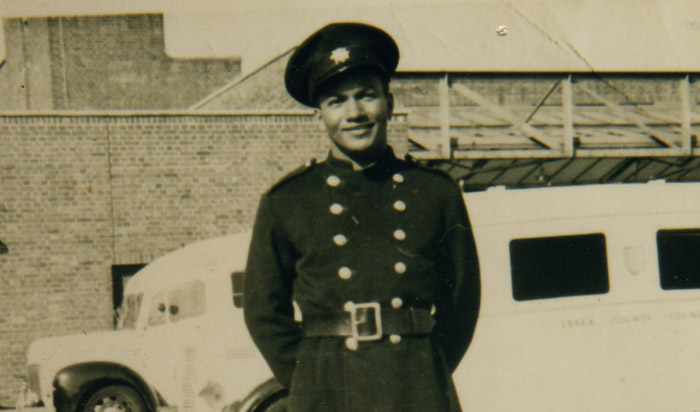Frank Arthur Bailey was born in British Guiana (now Guyana) in South America on 26 November, 1925. While growing up, he attended local schools and later started a job on a German trade ship which took him to New York. There, Frank got a job at a hospital, initially as a porter. He later became an assistant in the physiotherapy department where he staged a walkout in protest to racially segregated dining facilities.

Frank came to London from Guyana in 1953, and within the same year, Frank became a member of the West Indian Standing Conference (WISC). This organisation represented African-Caribbean communities in Britain. The WISC sent Frank and a fellow member to a Trade Unions Congress (TUC) conference. At the conference they were told that there were no Black men in any Fire Service in England.
Joining the fire service
"I was told that the authorities were not hiring black men because they were not strong enough physically or well enough educated to do the job. I immediately recognised racism and said I’m going to apply to be a firefighter and see if they find me unfit”.
Frank applied to and joined West Ham Fire Brigade in 1955, serving at Silvertown Fire Station, and it is believed that he was likely the first full-time Black firefighter in this brigade, and possibly the first in the country. West Ham Fire Brigade became part of the London Fire Brigade in 1965, when the London’s borders were expanded and the Greater London Council (GLC) was formed.
Firefighting and beyond
The booklet ‘In Our Own Words’, a collection of memoirs and a comprehensive history of Black and Asian staff in LFB, includes more of Frank’s most memorable experiences;
“I saved a fellow firefighter’s life when he fainted while we were on the fifth floor of a ladder drill session. I brought him down to the ground in a firefighter’s lift. The guy’s weight was 16 stone, and he was 6’2”.
“I used to listen to the stories the firefighters told of their war service experiences (most of them were ex-army, or navy, or Royal Air Force (RAF) so I was allowed an insight into the working-class man’s wartime service experiences”.
Frank was active in the Fire Brigade Union (FBU) and became branch secretary at his station. He also counted the then FBU General Secretary, John Horner as a close friend. In 1965 he left the Brigade. It was later suggested by a former colleague of Frank’s that being passed over for promotion in the Brigade because of his race, contributed to his reasons for leaving. After he left the Brigade he went on to become a social worker and the first Black legal advisor to Black youths at Marylebone Magistrates Court. Frank Bailey dedicated much of his life to the fight for equality, breaking several barriers along the way.
Legacy
Frank passed away on the 2nd December 2015, six days after his 90th birthday. In a statement read out at Frank’s funeral, the then London Fire Commissioner Ron Dobson said: “Frank was a pioneer and rightly challenged the out-dated practises prevalent at the time.
“He played an enormous role in the history of Black firefighters in this country and his legacy is still felt today as we strive to make London Fire Brigade reflect the diverse communities it serves”.
Retired firefighter and previous FBU National Secretary for Black & Ethnic Minority Members Michael Nicholas said: “His knowledge and passion for black self-organisation and progression in our society remains an inspiration to us today and he is rightly thought of as the father of black firefighting in this country and should not be forgotten.”

His legacy is far from forgotten. Frank was remembered with a Google Doodle in full uniform on what would have been his 95th birthday, illustrated by West Yorkshire based artist Nicole Miles.
This article was researched and written by museum volunteer Shilla P.